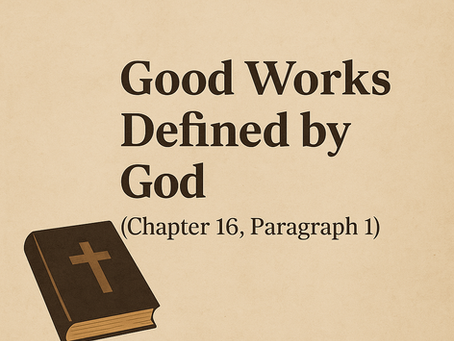top of page
Lighthouse Fellowship Reformed Church
Search
All Posts


The Purpose and Fruit of Good Works (Chapter 16, Paragraph 2)
Good works are not the root of our salvation, but they are its fruit. This paragraph teaches that good works, while not meritorious, serve vital purposes in the Christian life. They are expressions of gratitude to God, evidences of true faith, tools for strengthening assurance, means of building up fellow believers, and lights to the watching world. Good works glorify God by displaying His grace at work in us.
Oct 4, 20253 min read


The Father’s Reward: Living for What Matters Most
God the Father: Knowing the First Person of the Trinity The Father Is a Rewarder Hebrews 11:6 says: “Whoever would draw near to God must...
Oct 4, 20253 min read


Good Works Defined by God (Chapter 16, Paragraph 1)
This paragraph defines good works according to Scripture. True good works are not determined by human tradition or imagination, but by God’s revealed will. They are actions done in obedience to His Word and spring from saving faith. Though good works do not save, they are the necessary fruit of genuine faith and the Spirit’s work. They glorify God, benefit others, and affirm the believer’s transformation.
Oct 4, 20251 min read


October 3 – Marsilius of Padua: Challenging Papal Supremacy
When we think of the Reformation, we rightly picture fiery preachers, courageous martyrs, and pastors devoted to Scripture. Yet sometimes God used scholars and political thinkers to chip away at the towering claims of the medieval church. One such figure was Marsilius of Padua, a man who stood against the unchecked authority of the papacy and planted seeds that would grow into later reform.
Oct 3, 20253 min read


Day 29: Doctrine and Love
Paul exhorts believers to be “speaking the truth in love” (Eph. 4:15). Sound doctrine guards truth, but love ensures it is delivered with grace. Calvin said truth and love are inseparable for the church’s growth. Berkhof noted that doctrine must be “vitally related to life.” Doctrine without love hardens, and love without doctrine deceives. Together, they build the body of Christ in unity and maturity.
Oct 3, 20252 min read


No Sin Beyond Repentance (Chapter 15, Paragraph 4)
Paragraph 4 offers great comfort: no sin is too great to be forgiven when there is true repentance. While believers may fall into grievous sins—such as David’s adultery or Peter’s denial—God’s grace remains greater than their transgression. Through the covenant of grace, God has provided full and free pardon for those who repent, no matter how deeply they’ve fallen. This is not a license to sin but a promise of hope to the brokenhearted.
Oct 3, 20251 min read


The Father’s Chosen Ones Election and Love
God the Father: Knowing the First Person of the Trinity Chosen in Love Ephesians 1:4–5 tells us plainly: “He chose us in Him before the...
Oct 3, 20253 min read


October 2 – The Waldensians: A People of the Book in the Valleys of the Alps
When Peter Waldo laid down his wealth to follow Christ and proclaim the gospel, he could not have imagined the movement that would flow from his obedience. His followers, known as the Waldensians, became one of the most remarkable pre-Reformation groups in church history. Living mostly in the valleys of northern Italy and southern France, they were a community defined by their devotion to the Word of God and their willingness to suffer for it.
Oct 2, 20254 min read


Day 28: Doctrine Cultivates Holiness
Paul told Titus, “Speak the things which are fitting for sound doctrine” (Titus 2:1). Doctrine and holiness are inseparable. Calvin said, “Faith cannot be separated from good works, nor good works from faith.” Berkhof explained that doctrine is the root, with love and obedience as its fruit. Doctrine not only instructs but transforms, cultivating godliness that makes the church radiant before the world.
Oct 2, 20252 min read


The Fruits and Practice of Repentance (Chapter 15, Paragraph 3)
This paragraph teaches that saving repentance is not merely internal sorrow—it produces outward fruit. Repentance results in real change: confession of sin to God, humble prayer for forgiveness, abandonment of sinful ways, and a pursuit of obedience. True repentance is ongoing, not occasional. It touches every area of life and is to be cultivated constantly. Even after salvation, the believer must walk in daily repentance, striving to obey God by the Spirit’s power.
Oct 2, 20252 min read


The Father Who Sees in Secret
God the Father: Knowing the First Person of the Trinity God Sees Differently In a world obsessed with visibility, Jesus teaches something...
Oct 2, 20253 min read


October 1 – Peter Waldo: A Merchant Who Chose the Word of God
When we think of the Protestant Reformation, our minds usually run to Luther hammering his Ninety-Five Theses on October 31, 1517. But long before Luther, the Lord raised up men and movements that prepared the soil for the gospel’s rediscovery. One of the earliest was Peter Waldo, a wealthy merchant of Lyon, France, whose life was turned upside down by the words of Scripture.
Oct 1, 20253 min read


Day 27: Doctrine Produces Endurance
Hebrews 13:9 reminds us, “It is good for the heart to be strengthened by grace.” Sound doctrine fortifies believers against false teaching and trials. Calvin wrote that only the knowledge of God can sustain us. Sproul said sound doctrine enables us to stand firm to the end. Doctrine is not just knowledge—it is God’s means of strengthening His people to endure in faith and holiness.
Oct 1, 20252 min read


The Father’s Invitation to Prayer
God the Father: Knowing the First Person of the Trinity Prayer Begins with the Father When the disciples asked Jesus how to pray, He gave...
Oct 1, 20253 min read


The Nature of True Repentance (Chapter 15, Paragraph 2)
This paragraph explains the heart of true repentance. It is not mere remorse or fear of judgment, but a Spirit-wrought sorrow over sin as rebellion against God. The penitent sees sin for what it is—grievous and vile—and turns from it toward God with a sincere desire to obey. Repentance involves confession, prayer for pardon, and a commitment to walk in new obedience. It is not a work that earns forgiveness, but a fruit of saving grace.
Oct 1, 20252 min read


Day 26: Doctrine Shapes Mission
Mission flows from doctrine. Jesus said, “All authority has been given to Me… Go therefore and make disciples” (Matt. 28:18–20). The mission of the church rests on Christ’s lordship and centers on teaching His Word. Calvin said the gospel must be “openly proclaimed, that it may bring salvation.” Without doctrine, mission becomes vague humanitarianism; with doctrine, it brings the saving truth of Christ to the world.
Sep 30, 20252 min read


The Father’s Discipline and Our Growth
God the Father: Knowing the First Person of the Trinity Discipline Is a Sign of Sonship Hebrews 12:6–7 says: “The Lord disciplines the...
Sep 30, 20253 min read


The Grace of Repentance (Chapter 15, Paragraph 1)
Repentance is not merely sorrow for sin—it is a saving grace. Paragraph 1 teaches that true repentance is granted by God and always accompanies saving faith. It flows from the Spirit’s work of conviction and leads to a heartfelt turning from sin and toward God. This turning is rooted in a sense of God’s mercy in Christ. The penitent hates sin, confesses it, and seeks pardon, not as a condition for forgiveness, but as a response to grace already given.
Sep 30, 20251 min read


Faith That Grows in Grace (Chapter 14, Paragraph 3)
Paragraph 3 acknowledges that saving faith differs in strength among believers. Though faith may be weak or strong, it is still real if it clings to Christ. True faith may be under attack, clouded by temptation, or feeble through spiritual struggle—yet it is never extinguished because it is upheld by the power of God. This comforting truth reminds us that our security rests not in the intensity of our faith, but in the object of our faith: Jesus Christ.
Sep 29, 20252 min read


Day 25: Doctrine Shapes Leadership
Paul told Titus that elders must “hold firmly to the trustworthy Word” (Titus 1:9). Leaders are shepherds, called to feed and protect the flock with sound doctrine. Calvin said the church cannot stand without faithful teaching. Doctrine equips leaders to exhort in truth and refute error. Leadership divorced from doctrine is weak; leadership grounded in doctrine strengthens the whole church.
Sep 29, 20252 min read
bottom of page